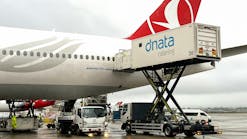Airport Workers Unite to Announce Worldwide Demonstrations
WASHINGTON, D.C., Sept. 26, 2018 (GLOBE NEWSWIRE) -- Inspired by the New York Port Authority’s vote on September 27 to raise the minimum wage for 40,000 workers at JFK, La Guardia, and Newark airports to $19—which will be the highest minimum wage in U.S. history, once approved—airport workers are jointly announcing worldwide demonstrations set to take place at more than 40 airports in 13 countries on October 2 to put airlines like United (UAL) on notice and call for fair wages, union rights, and safe workplaces in every country.
Through the International Transport Workers' Federation and the UNI Global Union, airport workers are planning protests at airports that control a whopping 36 percent of world air travel, where nearly 4 million people pass through each day. This includes United Airlines’ (UAL) domestic hubs and some of the world’s largest airports—including LAX in the U.S., Charles De Gaulle in Paris, Schipol in Amsterdam, and Flughafen in Frankfurt.
"I work hard cleaning United Airlines’ planes, but I'm paid so little that I have to live with my grandmother,” says Alicia Cooper, Lead Cabin Cleaner at Newark Liberty International Airport. “My dreams are on hold. I want to go to college, get my own apartment, and buy a car so I don't have to take two buses to get to work. On these wages, it's not possible right now. That’s why we joined together in union to win better pay and benefits.”
Baggage handlers, security officers, cabin cleaners, janitors, wheelchair attendants, and other contracted airport workers provide soaring profits to the global airline industry, which is projected to profit $38.4 billion in 2018, while struggling to make ends meet on low wages and often without benefits or paid days off.
In the U.S., nearly half of all airport workers are paid so little that they have to skip meals or go hungry and nearly 30 percent are forced to rely on public assistance for basic needs like food, housing, and medical care. In Thailand, some airport workers are paid just $10 a day, which is half of the living wage for that country. Airport workers in Indonesia are only paid $1.50 an hour—far below what it takes to cover basic necessities.
“This is clearly a global problem. And if the problem has become global, we have to come together all around the world to fight for our rights as workers,” says Edi Lesmana, an IT Analyst at Seokarno Hatta International Airport in Jakarta, Indonesia.
With respect to both the wages and the union rights of United’s subcontracted workforce, the airline's practices have raised major concerns around racial equity. Subcontracted workers are paid a fraction of what most direct employees are paid. And while nearly 100 percent of United’s non-managerial employees are represented by a union, a majority of its contracted workers—who are mostly people of color and immigrants—do not have those same rights and benefits. Further, United Airlines has a track record of actively fighting subcontracted workers’ efforts to exercise their right to form a union.
United Airlines is one of the worst offenders when it comes to taking our tax dollars and charging excessive fees. The airline has received an estimated $44 billion in taxpayer support and brings in the most ancillary income, which includes baggage fees and reservation change fees, of any airline—$5.7 billion last year.
Despite airlines driving a race to the bottom and attempting to divide workers along racial lines, airport workers have won union rights, wage increases, job protections, and other benefits by the tens of thousands by coming together across their differences and working hand-in-hand with elected officials all across the U.S. to make sure that the publicly-funded aviation infrastructure works to the benefit of all people—and not just wealthy special interests. The historic vote that will raise wages for New York and New Jersey airport workers is the latest example of airport workers winning by urging elected officials to support unions and working people.
“In city after city all across the country, airport workers have won raises—doubling their income in some cities—and the right to form a union,” says Mary Kay Henry, President of Service Employees International Union (SEIU). “They've done it by coming together to elect leaders who work for all of us, no matter our skin color or zip code, and calling on those elected officials to hold greedy corporations accountable. We won't stop until all working people—white, black and brown—can join together in unions for the power in numbers to win higher wages, affordable healthcare and a better life for their families.”



